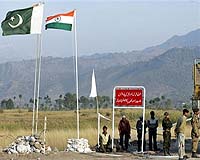| . |  |
. |
Golestan, Afghanistan (AFP) Nov 2, 2009 Military interpreter "Rocky" has the combat record and desert camouflage gear of a US Marine, having already survived eight bomb attacks while on patrol in rural southwest Afghanistan. The last explosion threw him from an armoured vehicle and wounded his leg, putting him in a military hospital for two weeks. But for the 24-year-old whose real name is Salim Jawed Stanikzai, there is no question of quitting his job as a "terp," because after two years he will get a temporary visa to the US, where he wants to study politics. "I'm not enjoying (the danger), I'm not telling you I'm enjoying it. I hate that," said Stanikzai. "But I have to make money and I have to go to the United States. This is my idea, this is my dream. I want it to become true," he said. The same is true of all the "terps," as they are called, at the Marines' base in Golestan -- they do dangerous work in the hope of a big pay-off. Each day they put on flak jackets and kevlar helmets to go on patrols and operations with the men of the 2nd Battlion, 3rd Marine Regiment. The Marines walk around the sparse mud compounds of villages hostile to their presence, using the interpreters' command of English and Pashtu to win over the locals and gain some intelligence on the Taliban. The interpreters, who work far away from their home provinces for their safety, explain to villagers that the Marines will build them schools and irrigation systems if only they will stand up to local militants. The work is key to attempts by coalition forces to defeat a fierce Taliban-led insurgency in southern Afghanistan. "They do a lot for us. They have helped us on a lot of missions as far as getting valuable information, giving us a heads up," said Fox company's First Sergeant Manuel Martinez. "Sometimes the locals are real good and they'll let us know 'hey, you got an IED (improvised explosive device) up ahead'. These are the guys who get the information for us so they do become part of the team," he said. But no matter how integrated into the team the interpreters might seem, there remains a suspicion, simply because they are Afghans. "You always have to be suspicious and maintain a healthy sense of paranoia," said Company Commander Francisco Xavier Zavala, 33. "Actually the locals appreciate that because it's safety for them as well," he said. Peppering his talk with American colloquialisms, another interpreter, who asked to be referred to as "Hector," said he believed his work would help bring peace to his country. "Maybe (the Taliban) will say: 'Those guys (Americans) respect us so why are we putting the IED? Why are we attacking Marines vehicles? Why are we shooting them?'" said Hector. Nevertheless, he has not told his parents what work he does. "Everyone tells me working with the Marine corps is dangerous and one day maybe he will be wounded, maybe he will be killed, so I don't want to make problems for my parents," he said. Many interpreters have been killed on military operations, while some have been specifically targeted by militants because they work with foreign forces. Mohammad Idris Afzaly, 20, from Kandahar, resigned a day after meeting with AFP, deciding the risk was too great. Afzaly said he wanted to study law in the US but was spooked by reports of interpreters being targeted. "I hear that if you work with US or British or any foreign countries they cut off your head," he said of the Taliban. "They're saying 'Why are you working with foreign countries? You are not Muslim'," he said.
Share This Article With Planet Earth
Related Links News From Across The Stans
 Indian Kashmir starts safaris as violence falls
Indian Kashmir starts safaris as violence fallsSrinagar, India (AFP) Nov 2, 2009 Tourists are now going bear-spotting on wildlife safaris in a scenic wilderness where Kashmiri rebels and Indian troops used to exchange deadly gunfire. The start of safaris in Dachigam National Park follows a big drop in insurgency-related violence in the spectacularly beautiful region of grasslands and rocky outcrops, wildlife officials say. The safari trips through dense forest -- the ... read more |
|
| The content herein, unless otherwise known to be public domain, are Copyright 1995-2009 - SpaceDaily. AFP and UPI Wire Stories are copyright Agence France-Presse and United Press International. ESA Portal Reports are copyright European Space Agency. All NASA sourced material is public domain. Additional copyrights may apply in whole or part to other bona fide parties. Advertising does not imply endorsement,agreement or approval of any opinions, statements or information provided by SpaceDaily on any Web page published or hosted by SpaceDaily. Privacy Statement |